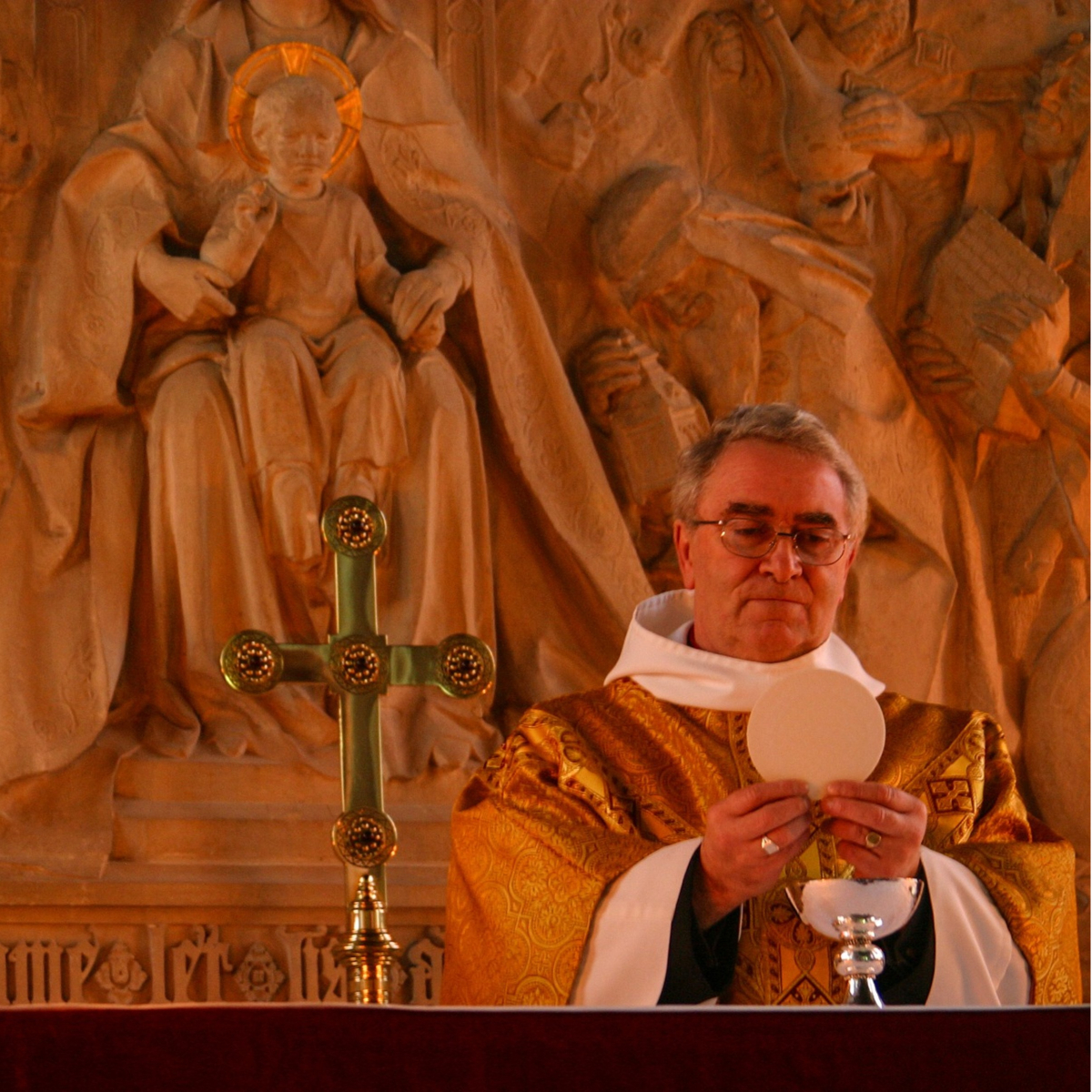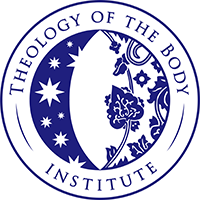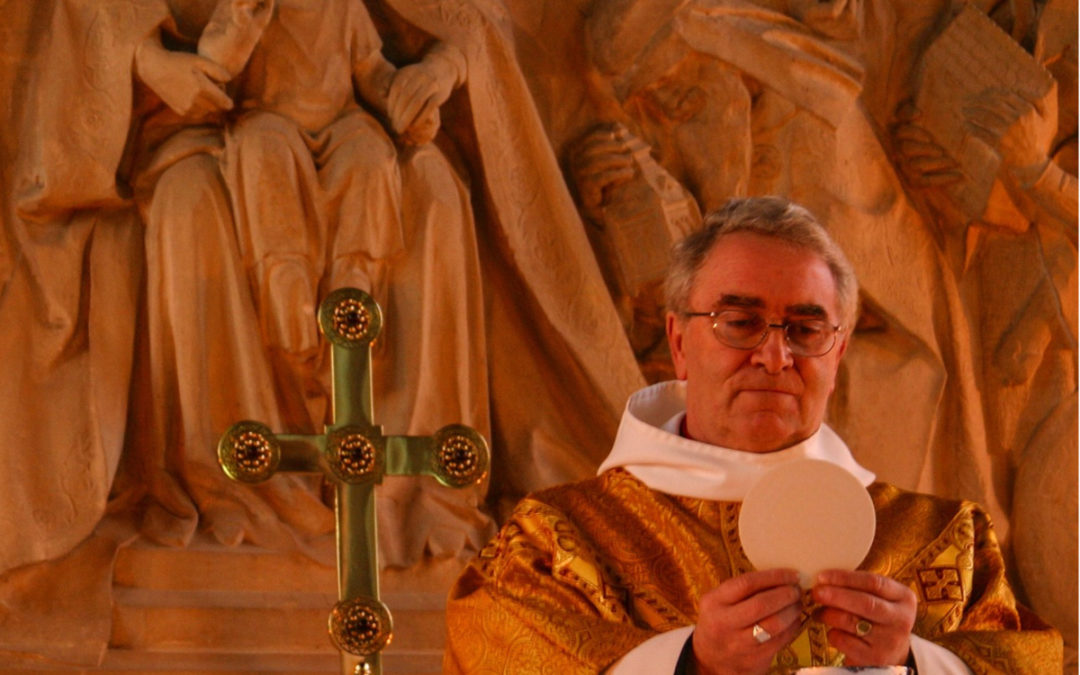

What a Priest Is Supposed to Be
What a Priest Is Supposed to Be

[NOTE: For National Vocations Awareness Week (Nov. 3-9, 2019), the following is excerpted from a homily by Father Patrick R. Schultz delivered Aug. 19, 2018. It is transcribed and printed with his permission. Father Schultz is a priest of the Diocese of Cleveland and has served as a TOBI chaplain for its immersion courses.]
It’s been so hard reading and watching the news over the past [several] weeks and days as we hear again the incredible abuse and negligence of churchmen from within the hierarchy; not just priests and bishops, but all the way up to cardinals, and my heart is just shattered — it’s just shattered — for the victims and their families, and for this Church that I love so much. I’ve spent many of my holy hours this week sitting in front of the Blessed Sacrament, sitting in front of Jesus speechless; I’m not quite sure what to say to him or what to ask of him, other than, “Why?”
I’ve been really blessed by a number of people from this parish and around the diocese, a number of people who have reached out through emails and text messages, things like that, just to check in, to offer words of support, just to check in and see how I’m doing, how I’m processing, how priests of the diocese are doing, how we’re processing. And the honest to God truth is: it’s not been easy, it’s been a struggle…I’m angry, confused, hurt, I’m disgusted, heartbroken…I feel betrayed by brother priests, I feel betrayed by bishops. This is the first time since I was ordained a deacon in 2015 that, putting clerics on in the morning, going out, walking on the streets that I am very conscientious of what I’m wearing.
I was ordained in 2016, and entered the seminary in 2008, and I feel like my generation, my classmates and ordination class were ordained at a very interesting time, and formed during a very interesting time. Between these two lulls, it feels like we always had the abuse crisis hanging over our heads, we always had it in our minds, it was always part of conversation. We knew that we would be coming into a Church that was badly battered and wounded and desperately in need of healing. But this is the first time walking around as a priest that I … I feel it. I feel it.
I imagine we’re all struggling to comprehend this. All my conversations with my brother priests … have been the same. And I know it might feel trite and cheap, but I just want to say I’m so sorry that we’re here, and that we’re having this conversation, that we’re dealing with this. I’m so sorry that this is where we are again. I’m so sorry if you feel like “Man, I was really starting to get it, and buy into this faith,” and this is now totally rocking your faith. I’m sorry if there are conversations that you’ve had to have with family members or coworkers who have always had maybe a slight prejudice against the Church, and you’ve always felt like you’ve been on the defensive trying to defend the Church, and it just feels exhausting. And I’m sorry if you have ever felt a lack of love by the Church. People come to the Church and to the Church’s priests expecting to find Jesus, and that doesn’t always happen…and I’m just sorry that that’s the case.
But as I was sitting up here when we were starting Mass, my heart was so filled with such gratitude, like looking at all of you…I was wondering if anyone was going to come to Mass this morning. And you’re here. And it seems like a big crowd today. And I’m so grateful. I guess that’s why you’re called The Faithful, because you just keep showing up. You just keep coming and you just keep showing up. And it inspires me so much.
I see in so many of you that you sense that there’s something here that I must have that I cannot get anywhere else. The Catholic Church is not just walls and marble, it’s not merely the aggregate of celibate men in Rome, it’s not only bishops and priests. It’s the people of God. The Church is the instrument of Salvation, for good or for ill, it’s how the Lord has chosen to effect salvation through time, working through human instrumentality. It’s the place where God’s power is channeled through human weakness, where God’s riches are channeled through human poverty, and where God’s wholeness is channeled through human brokenness.
In a little bit, when we stand up and pray the Creed, we’ll say again, just like we’ve said every other Sunday: “I believe in one, holy, catholic, and apostolic Church…” And despite appearances to the contrary, it will remain true. This Church of ours is holy – not necessarily because her members are holy, not necessarily because her popes or bishops or priests are holy, but because Jesus has given the gift of his Spirit to this Church, and he’s promised that the gates of hell will not prevail against it. The Lord has given this Church Treasure – the sacraments and the Scriptures — and we can’t screw that up.
And I personally am so acutely aware today, perhaps more than ever, of the absolute privilege of being a priest…it is an awesome, awesome privilege to be a priest. And to be called to this task by Christ today. I’ve been asking Jesus all week, “Lord, what do you want me to tell them?” and I keep hearing: “Tell them what a priest is supposed to be…”
There’s a moment during the Ordination ritual, after priests are ordained, after you’ve just been clothed with vestments, and your hands are anointed, where the newly ordained priest kneels before the bishop, and the bishop, handing him a paten with unconsecrated hosts and a chalice with unconsecrated wine, says: “Receive the oblation of the holy people, to be offered to God. Understand what you do, imitate what you celebrate and conform your life to the mystery of the Lord’s Cross.”
I guess that’s what I’ve been turning over and over in my head and heart. As priests, our deepest identity is supposed to be found in the Lord’s cross, conforming our lives to the pattern of his self-giving love that we receive in the Eucharist, that’s what it’s supposed to be – that we, more than anybody else, are called to be the first emulators of Christ. That when we say “This is my body given up for you,” we should mean it, personally. Christ has invited me to share the personal pronoun of the Son of God. This is my body.
There is supposed to be a deep, deep affinity between the priest’s identity and the Eucharist he consecrates at the altar – he is supposed to be, like the Eucharist, a source of life-giving love. He is supposed to be, just like the Eucharist, taken by Jesus, blessed, broken, and given to the people of God. Just like the sacraments, that people have a right to, the people have a right to the priest.
Jesus instituted the priesthood because human spousal love, from beginning in the Book of Genesis, was intended by God to be a sign of the marriage between Christ and the Church. St. Paul says: “For this reason, a man shall leave his father and mother and be joined to his wife, and the two shall become one flesh. This is a great mystery, but I mean in reference to Christ and the Church.”
The communion of Adam and Eve – the communion between spouses, was meant to be a sign that pointed to what happens here at Mass, to Holy Communion, and to what our heavenly destiny will be – United with Christ at the Wedding Feast of the Lamb. These aren’t just accidental images that the Church gives. The Eucharist is the fullest expression of Jesus’ love for you; it’s the Sacrament of the Bridegroom and the Bride, where heaven and earth become one flesh.
When he promised His Bride, “behold I will be with you even until the end of the age” he meant it…not in some metaphorical way, but in a literal way. “I will remain with you in the Church, in her Scriptures, and Sacraments….and in my priests whom I will choose and call and form in my love – I will teach them how to love the Church, my Bride – I will teach them how to hear my voice and how to be brave in sharing my life-giving truth. And I will teach them to say, just like a bridegroom says to his bride, ‘This is my body given up for you.’”
Those words are not supposed to be rote; those words are supposed to be romance.
Just like the wedding vows married couples say on their wedding day, so too these words of consecration are supposed to form and shape every facet of a priest’s life. Priests are not just servants, or ministers or reverends; we’re not spiritual social workers or counselors. We are, first and foremost, beloved sons of the Father, who are baptized sinners, and we’ve been called by Jesus to embody the love of the Bridegroom for the Church, the Bride – we’ve been called to give the gift of our lives through, with, and in Jesus at the altar. And we are supposed to be Spiritual Fathers who nourish our children with the Word of God, with the Truths of the Faith, with the Sacraments, with our very presence – to be involved in your lives. And to feed you with the Eucharist.
You see, the truth is, Jesus called and continues to call sinners to the priesthood, because, quite frankly, that’s all that is available. He entrusts us with treasure that we hold in earthen vessels.
We’ve seen in the last several weeks, in dramatic and horrific fashion, just how fragile and weak those vessels are – and I doubt we’ve heard the end of it. But all I know at this point, on this Sunday, is that I want to keep my eyes on Jesus amidst this storm – and as I look at him in this Gospel [Jn 6:51-58], I see a Jesus who is so serene and powerful and in control. I see a Jesus who, even though he is terribly misunderstood by the crowd, I see a Jesus who leans into the controversy, who leans into that place of confusion. I see a Jesus who doesn’t back down, he doesn’t shy away.
As these storm clouds gather right now over our Church, I’m taking my cues from him. I want to lean in more, and I want to double down on my commitment to him, and to you. He’s all in, and so am I. And what I need, what your priests need, are your prayers because you are the faithful, you are powerful, so please, pray for me, pray for all my brother priests.
Lord Jesus, you are still in control. You are at the helm of the ship still. We trust in your mercy, we trust that there is nothing so broken that you can’t fix it, that there’s nothing so corrupted that your light can’t touch it. There’s no darkness so deep that you can’t illumine it with hope. We trust in your providence and the purifying effect of your Spirit right now for your Church and in your Church. We ask that Holy Spirit to bring revival. Come, Lord, and renew the Church, renew the priesthood, and increase in all of us a hunger for the Bread of Life. Amen.




